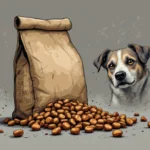
Introduction
When it comes to our furry friends, dog nutrition is of paramount importance. A well-balanced diet can lead to a long, healthy, and vibrant life for dogs. However, many misconceptions persist about what constitutes appropriate dog food. Pet owners often find themselves questioning what human foods are safe for their dogs, leading us to a common inquiry: can dogs eat Tic Tacs? Understanding the dietary restrictions and suitable snacks for dogs is crucial, not only for their health but also for their well-being.
Understanding Dog Nutrition
Basics of Dog Nutrition
Dogs require a well-rounded diet composed of essential nutrients to thrive. The primary categories of these nutrients include:
- Proteins: Vital for growth, muscle development, and overall health.
- Fats: Provide concentrated energy and support cell structure.
- Carbohydrates: Serve as a source of quick energy.
- Vitamins: Essential for various bodily functions and disease prevention.
- Minerals: Important for bone health, nerve function, and overall metabolic processes.
A balanced diet ensures that dogs receive adequate amounts of these nutrients, promoting optimal health and vitality.
Common Nutritional Needs by Dog Size and Breed
Nutritional requirements can vary significantly based on a dog’s size, breed, and life stage.
-
Small Breeds: Generally require higher calorie density due to their fast metabolism. They may benefit from smaller kibble sizes.
-
Medium Breeds: Have a more moderate caloric requirement and can typically eat standard-sized kibble.
-
Large Breeds: Need to be cautious about their calcium and phosphorus intake to prevent skeletal issues.
Puppies have unique nutritional needs for growth and development, while senior dogs often require lower calorie diets to prevent obesity.
Recognizing Food Allergies and Sensitivities
Food allergies in dogs can arise from various ingredients commonly found in commercial dog food. Some common allergens include:
- Beef
- Chicken
- Dairy
- Wheat
- Soy
Signs of food allergies may manifest as skin irritations, gastrointestinal disturbances, or excessive itching. Awareness of these potential allergies is vital for maintaining a dog’s health.
Human Foods and Dogs
Safe Human Foods for Dogs
While many human foods are safe for dogs, it’s essential to know which ones are suitable. Here’s a list of dog-friendly foods:
- Fruits: Apples (without seeds), blueberries, and bananas.
- Vegetables: Carrots, green beans, and sweet potatoes.
- Meats: Cooked chicken, turkey, and lean beef (without seasoning).
- Grains: Cooked rice and oats.
When introducing new foods, it’s best to do so gradually to monitor for any adverse reactions.
Toxic Foods for Dogs
On the flip side, several human foods can be toxic to dogs. Some of the most harmful include:
- Chocolate: Contains theobromine, which is toxic to dogs.
- Grapes and Raisins: Can cause kidney failure.
- Onions and Garlic: May damage red blood cells.
- Xylitol: A common sweetener that can lead to insulin release and hypoglycemia.
Symptoms of poisoning can range from vomiting and diarrhea to lethargy and seizures. If a dog consumes a toxic food, immediate veterinary attention is necessary.
Can Dogs Eat Tic Tacs?
Ingredients of Tic Tacs
Tic Tacs are primarily composed of sugar, flavorings, and artificial sweeteners. While they are marketed as a breath freshener for humans, their suitability for dogs is questionable.
Sugar and Artificial Sweeteners
Sugar is not toxic to dogs, but it can lead to obesity and dental issues when consumed in excess. However, the presence of artificial sweeteners, particularly xylitol, is where the danger lies. Xylitol is extremely toxic to dogs, causing insulin release, leading to hypoglycemia, seizures, and even liver failure.
Potential Risks of Feeding Dogs Tic Tacs
Feeding Tic Tacs to dogs can pose several risks:
-
Short-term Effects: Dogs may experience digestive issues like diarrhea or vomiting. The sugar content can lead to hyperactivity, similar to what humans experience after consuming sugary snacks.
-
Long-term Health Concerns: Regular consumption of sugary snacks can contribute to obesity, dental problems, and potentially serious metabolic conditions.
Expert Opinions and Recommendations
Veterinarians and pet nutritionists generally advise against feeding dogs human candies, including Tic Tacs. Instead, they recommend alternatives specifically designed for dogs that promote dental health and freshen breath without harmful effects.
Alternatives to Tic Tacs for Dogs
Natural Breath Fresheners
There are several natural options that can help freshen a dog’s breath without the risks associated with Tic Tacs:
- Parsley: Known for its breath-freshening properties.
- Carrots: Crunchy and fibrous, they can help clean teeth and freshen breath.
- Apples: The crunchiness can aid in oral hygiene, and they are safe for dogs.
Store-bought Dog Treats
Many commercial dog treats are formulated to promote dental health and freshen breath. Look for products that contain specific ingredients like:
- Baking soda
- Chlorophyll
- Natural enzymes
Brands such as Greenies or Zuke’s offer treats that can help combat bad breath while being safe for canine consumption.
Homemade Dog Treat Recipes
Creating homemade dog treats can be a fun and healthy alternative. Here’s a simple recipe you can try:
Peanut Butter and Pumpkin Dog Treats
Ingredients:
– 1 cup of pumpkin puree
– ½ cup of peanut butter (ensure it’s xylitol-free)
– 2 cups of whole wheat flour
– 1 egg
Instructions:
1. Preheat your oven to 350°F (175°C).
2. Mix all ingredients in a bowl until a dough forms.
3. Roll out the dough and cut into desired shapes.
4. Bake for 20-25 minutes until golden brown.
These treats not only provide a tasty snack but also support oral health.
Importance of Proper Nutrition for Dogs
Benefits of a Balanced Diet
Feeding dogs a balanced diet leads to numerous health benefits, including:
- Improved energy levels
- Healthier skin and coat
- Enhanced immune function
- Better digestion
A nutritious diet is foundational for overall well-being.
Regular Vet Check-ups and Diet Assessments
Regular veterinary check-ups are essential to assess a dog’s dietary needs. As dogs age, their nutritional requirements may change, necessitating adjustments to their diet. Consulting with a veterinarian ensures that your dog receives the appropriate nutrition for their life stage and health status.
Monitoring Weight and Health
Maintaining a healthy weight is crucial for a dog’s longevity. Here are some tips to help keep your dog at a healthy weight:
- Portion Control: Measure food portions according to the dog’s size and activity level.
- Exercise: Regular physical activity helps maintain a healthy weight.
- Healthy Treats: Opt for nutritious snacks and limit high-calorie treats.
Conclusion
In conclusion, understanding dog nutrition is vital for ensuring the health and happiness of our pets. We’ve explored the importance of a balanced diet, the risks of feeding dogs human snacks like Tic Tacs, and the benefits of offering safe alternatives. By making informed choices about our dogs’ diets and seeking professional guidance when needed, we can promote their well-being and longevity. Prioritizing proper nutrition is one of the best gifts we can give to our furry companions.
References
A comprehensive list of credible sources has been used to compile this article, including veterinary websites and pet nutrition books. For those interested in diving deeper into dog nutrition topics, numerous resources are available for further reading.









